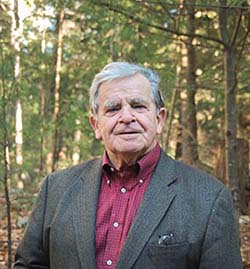 |
 |
| current issue |  | past issues |  | send a letter/news |  | address update |  | advertise |  | about us |  | alumni home |
Features
|
An Interview with Dick Fernandez '60 |
|

|
Dick Fernandez '60 has spent his life working for social justice. He became a prominent antiwar activist during the Vietnam period. Over the years he has directed three advocacy groups and served on the boards of many nonprofits, including several with which he remains active. A widower with three sons and eight grandchildren, he lives in Philadelphia and often spends time at Squam Lake in New Hampshire. Fernandez talked with writer Jane Harrigan about the road he's taken since leaving UNH—including stops in Paris, Hanoi, and a North Carolina jail.
Q: You started at UNH twice. What's the story?
I was president of my freshman class (in 1953) and played on the basketball team, and I had a lot of fun being involved in campus activities. By the time my grades came in, I had sure proof that I had enjoyed my social life.
The dean said I could either go on probation and pull my grades up—but not play basketball—or I could drop out, take a couple courses close to home, and reapply in the fall. It took me about 10 seconds to say, "I think I'll leave." That was me saying out loud something deep inside that I'd been unaware of: I really didn't know what I was doing at UNH.
A couple weeks later, on the prompting of a high school buddy, I volunteered for the draft, a two-year commitment. My parents got upset; my friends couldn't understand. Only my pastor said, "Well, you might enjoy two years in the service." What he meant was, "You might even grow up."
Q: So you were in the Army, mostly in Japan, and came back wanting to be a minister?
In the Army I became a very conservative evangelical Christian. When I returned to Durham, I rented a room from G.R. Johnson, a history professor who had been an evangelical earlier in his life and had moved away from it. He opened up a whole new world of religious thinking and social responsibility to me. By the time I left UNH, I knew that whatever my ministry was, I wanted to continue to be engaged in issues of peace and justice.
Q: You've worked in multiple places on multiple issues. Tell us about some of them.
My friend and teacher Harvey Cox and I and some others were asked by the Southern Christian Leadership Conference to go down and support the protests in Williamston, N.C., to help the local African American residents. That became a 2-year commitment. I spent time in jail, and my car was hit by a Molotov cocktail—with me in it. Eventually our efforts led to integration of the local library and swimming pool.
My first job after seminary was director of the Christian Association of the University of Pennsylvania, a group of nine campus ministries. We got involved in avant-garde theater and draft counseling, and in 1965 we held a silent vigil about Vietnam outside the college president's house. Our small band of protesters got beaten up by some other students, and it made the papers. Six of us resigned when the board was being unreasonable, about that and other things.
Q: After Penn you were often in the news for your activities in the Vietnam protest movement. How did that come about?
My friend William Sloane Coffin, chaplain at Yale, helped me land a job with a new group, Clergy and Laity Concerned. We grew as the war expanded. One aspect was my involvement with the Committee of Liaison in New York, which provided letter exchanges between POWs and their families. On two trips, I carried hundreds of letters to Paris and Hanoi from families, and returned with several hundred letters for the families from the POWs. As we carried on what I'd describe as a lovers' quarrel with our leaders about American policy in Vietnam, I found the work at once painful and important.
Q: Later you spent three years trying to help Ohio steelworkers buy a closed mill, and then 21 years running the Northwest Interfaith Movement in Philadelphia. You've also worked on early-childhood education, lifetime care for seniors, and many other issues. What thread connects all those efforts?
Going back to the Army and the friends I made through the Bible study group, the way they lived their lives, I realized that what you believe, if you have any integrity, is what you should do. I would not have been in the peace movement if I hadn't first been a fundamentalist. You have to do what you say you believe. Prayers need feet; faith needs traction. Through my anti-war work with Clergy Concerned, I realized that it's often easier to work for social justice along interfaith lines than to depend solely on one congregation. That's particularly true if you're doing advocacy work. There are many more people willing to provide services to the poor and the marginalized than there are people willing to advocate for better public policies. It's easier to give a loaf of bread than confront a politician. And a loaf of bread is good—but if we don't change policy, you're going to be handing out bread for the rest of your life. ~
Return to The Road I've Traveled: A Lesson in Civil Rights

